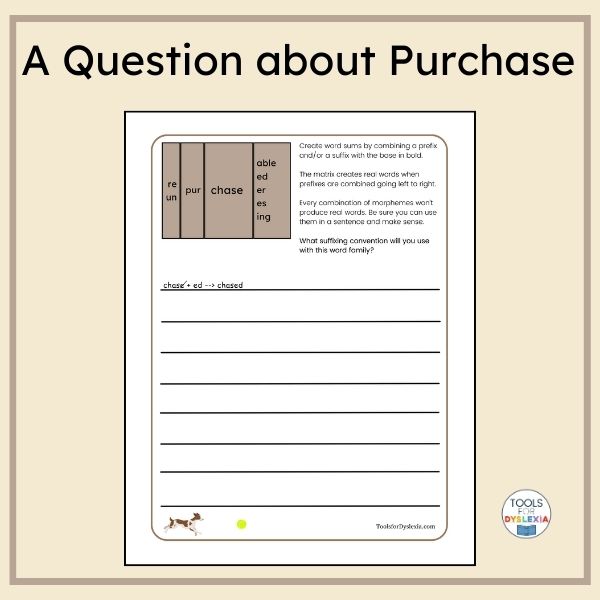How to Find an Unstressed Syllable
Why isn’t ‘purchase’ spelled with an <i> instead of an <a>? A third-grade student wanted to know after misspelling this word. This led to a discussion about how to find an unstressed syllable. But first we talked about meaning.
Meaning First
She is beginning to see that spelling does not always use a default spelling to match pronunciation. I asked her to use the word in a sentence.
She did: “Dad purchased the car.”
Morphology & Word Sums
We talked over some potential word sums to show the structure of the spelling.
purchase + ed or pur + chase + ed
What Can We Learn from Etymology
Etymonline.com showed us that it came into English from an Anglo-French word spelled <purchaser> and before that from Old French: <porchacier>. The Old French had a meaning of “search for, pursue eagerly.” That made me think of Black Friday and the push and shove that sometimes happens in the pursuit of deals.
Reading the entry, we noted that purchase is related to chase and how fitting that term is for what happens during the Christmas gift-buying missions we all go on. I love learning new things with students.
Why had I never connected the spelling of <chase> in purchase to relate to chase, chased, chasing? Can you guess the reason I, and maybe you too, had never made that connection even though the spelling is clearly there?

Phonology & Unstressed Syllables
How do we pronounce purchase? /pɝ’ tʃəs/ “per chis” sort of, but really it is unstressed, schwa, as shown in the International Phonetic Association (IPA) with an upside down <e> symbol. These are symbols, not letters. Schwa is the unstressed vowel phoneme, the most common phoneme in English.
Why is <chase> pronounced “chis”? It has to do with stressed and unstressed syllables.
In purchase, we enunciate the “pur” more actively and longer–that’s the stressed syllable. The last syllable is not enunciated much and is pronounced /tʃəs/–that’s the unstressed syllable.
Linguists describe the unstressed vowel as being neutral. I know, I know… for some of us we may feel “purchase” has a /ɪ/ short-I and not a schwa.
But is the second vowel phoneme in that word a clear /ɪ/ vowel phoneme? Compare “sit” to “purchase”. Not the same /ɪ/.
Schwa can feel like a weak /ʌ/ short-u or a weak /ɛ/ short-e or weak /ɪ/ short-i depending on the word. Schwa is always unstressed so it’s not pronounced the same as any stressed vowel phoneme.
An Easy Way to Find the Stressed Syllable
Raise one hand palm down above a desk in front of you. Say the word aloud while letting your hand drop to the desktop. The stressed syllable will be the one you spoke at the moment your hand hit the table. Be sure to say the word naturally without unnatural stretching it out or over-enunciating or overthinking. It can take some practice.
Another method is to Call the Dog. Whatever your word, use it as if you’re calling the dog to come in from the backyard. “Pur–chase”. The syllable that you stretched longer is the stressed syllable.
And the ones that are not stretched longer are unstressed. No one ever taught me about stressed syllables or how to find the stressed and unstressed syllables. But I’m teaching my students. Not only does it help them understand a schwa spelling but it’s critical to knowing when to apply the doubling suffixing convention.
Back to the Word Sum
Then from what we learned from Etymonline.com showing the base as <chase>, we reviewed our word sum and determined it would be: pur + chase. The <pur-> prefix having the sense of “forth”-go forward, combining with <chase>.
Purchase in its earlier sense meant –“chasing forward”. That earlier, historic sense is called the orthographic denotation. We can still see a hint of that meaning today. Consider buyers wanting to get the Black Friday advertised discounted price of something that may sell out before they grab theirs. They’re chasing forward to make their purchase!
Back to the Student’s Question
“So why isn’t ‘purchase’ spelled with an <i> instead of an <a>,” I asked her.
“The base is ‘chase’,” she noted.
“Could we spell it <chise> and make sense with the history and meaning of the word?” I asked.
“No, we can’t.”
The spelling and meaning connections use phonology with phoneme-grapheme correspondences. But meaning and historical meaning connections drive spelling. English is stress-timed which affects our pronunciation like it does in purchase.
Think about purchase’s connection to chase the next time you’re chasing a deal. Here’s a free ready-to-use matrix with the <chase> word family.


